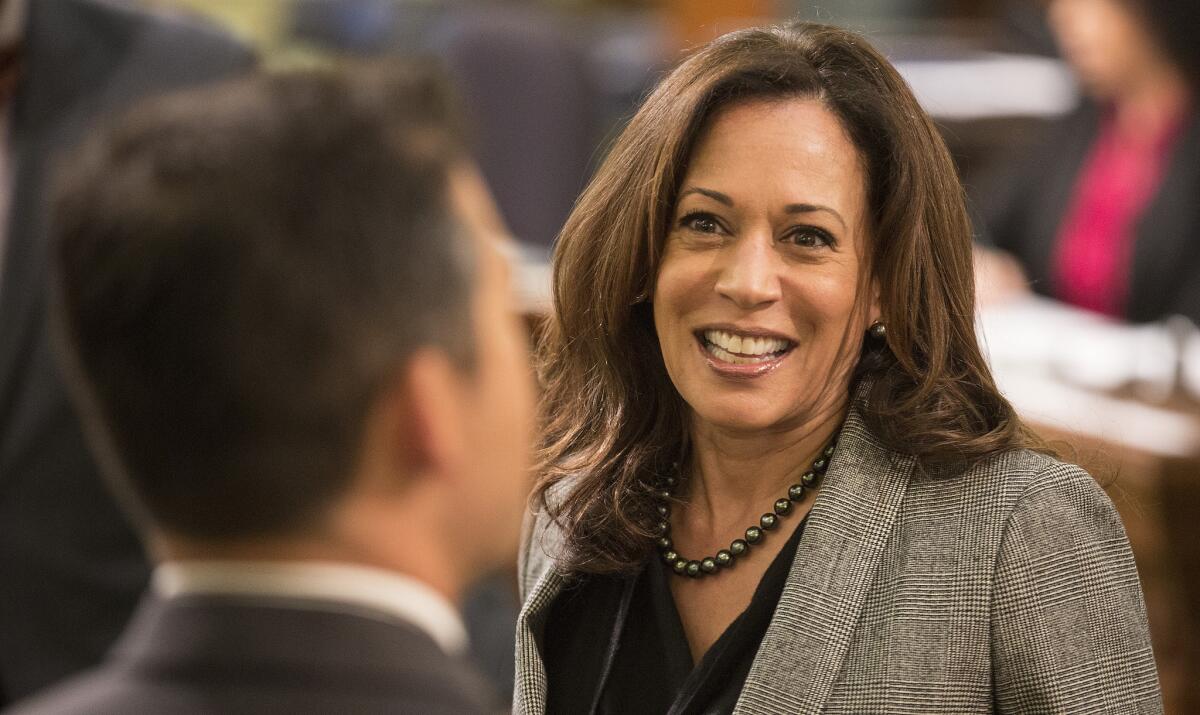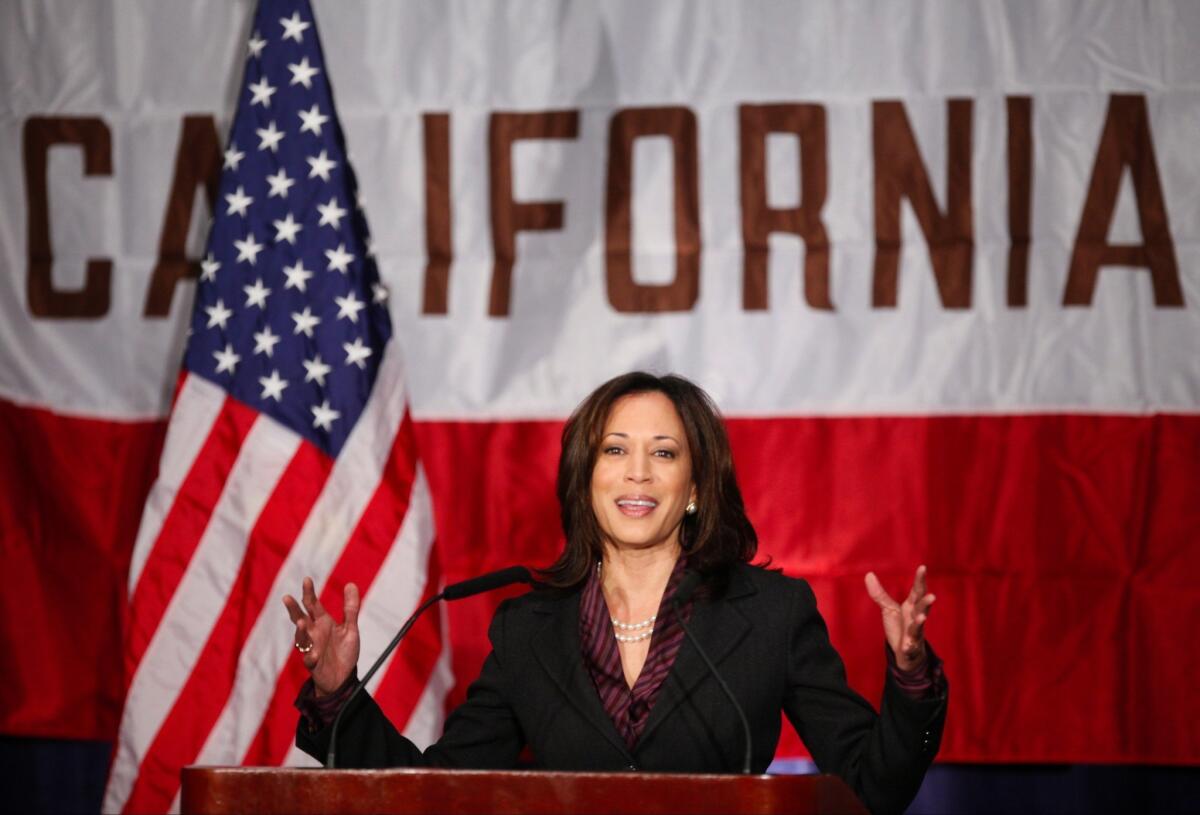Analysis: Don’t expect populist rhetoric in low-key California Senate race

Senate candidate Kamala D. Harris and her Democratic opponent, Rep. Loretta Sanchez, have stayed away from the sharp populist rhetoric of the party’s presidential candidates.
There’s a disconnect between the message being delivered by the Democratic candidates for president and the message being delivered by Democrats running on the presidential ballot for California’s seat in the U.S. Senate.
Driven by the success of Bernie Sanders’ presidential challenge, the national campaign has lurched to the left in a big way. Hillary Clinton’s campaign speeches are now almost echoes of the Vermont senator’s, as both emphasize condemnation of Wall Street for excesses leading up to the nation’s 2008 economic crash. Both demand better behavior from what Sanders calls “corporate America,” and both threaten a crackdown otherwise.
The biggest presidential issue of late has been trade and its effect on American jobs. Sanders argues that almost all trade deals should be shredded, blaming past accords for decimating manufacturing and other jobs located in the United States. Clinton — who has supported past agreements, although she opposes the pending Trans Pacific Partnership measure — has countered that as president she would enforce new job-protection measures.
None of that is being talked about in the low-key race for a Senate seat that has been held since 1992 by Democrat Barbara Boxer, who is retiring. The rhetoric in that race has been conventional, exactly what might have been uttered one, two, three political cycles ago.
That reflects two realities. First, despite the state’s wacky national reputation, its political figures haven’t been at the tip of the ideological spear.

Atty. Gen. and Senate candidate Kamala Harris in Los Angeles.
Arnold Schwarzenegger ran and won twice statewide as a moderate Republican, a bit ahead of the pack on issues like climate change but not outside the bounds of the state’s political leanings, all “girlie men” bravado and dramatically staged events notwithstanding.
Democrat Jerry Brown campaigned as a Sanders precursor when he ran for president in 1992, full of outrage about the nation’s campaign finance system and about the moderate stances of his opponent Bill Clinton. (The two have since made up.)
But Brown — whether in two terms that started in the 1970s or the two that started in 2010 — has governed in Sacramento as a relatively conservative Democrat when it comes to the budget and the role of government. He, too, has pushed hard on climate change measures, with even more support from voters than Schwarzenegger.
The state’s senior senator, Dianne Feinstein, has all but defined centrism in Washington, confounding Democratic presidents almost as much as Republican ones. Boxer, while more liberal, has focused on issues other than the economic populism that Sanders has championed.
The second reality is that California itself is different than the states that have most recently defined the presidential campaign and the candidates’ arguments. Though trade has been a negative in the industrial Midwest, where it is blamed for the closure of factories that moved to other countries or simply vanished, California has a hugely diversified economy. Trade, in California, can represent a closed factory — or an explosion of jobs at the state’s ports and elsewhere.
In addition, the dominance of Latinos in the state Democratic Party shifts the conversation. In Michigan and Ohio, Sanders and Clinton were talking mostly to white and African American voters. In California, about 3 in 10 Democratic voters in the most recent USC Dornsife/Los Angeles Times poll were Latinos. They are, as a group, much more optimistic about the economy and may not react as Midwestern voters did to an anti-Wall Street, anti-trade argument.
The messages from Democrats running for Senate may change as the June 7 primary and Nov. 8 general election near. But so far, they’re lacking the populist edge of the presidential candidates.
Both candidates, state Atty. Gen. Kamala D. Harris and Rep. Loretta Sanchez (D-Santa Ana), laid out their arguments at last month’s state party convention. The Democrats are competing against several Republicans, with George “Duf” Sundheim and Tom Del Beccaro polling the highest, for spots in the top-two primary.
Sanchez called attention to her support in the past for the standard issues important to Democratic constituencies, including immigration reform, abortion rights, gun control and protections for organized labor. She mentioned the Pacific trade deal only in passing — and not in connection with its effect on jobs.
“I oppose TPP without hesitation,” she said. “I refuse to grant special trade status to nations that trample on human rights.”
Harris mostly set up her candidacy as an antidote to the “politics of poison” she said were coursing through the Republican presidential campaign. She, too, mentioned the traditional roster of Democratic goals, including all that Sanchez cited plus voting rights. Of the issues most prominent in the presidential campaign, only college debt surfaced, in one line.
“So Democrats, here’s what I believe this election is about,” she told delegates. “It’s about moving forward, together. It’s about who we are and who we want to be.... It’s about rejecting us versus them and that mantra of yesterday.”
Hard-fought campaigns tend to hone the candidates’ messages, particularly on issues with some pull among voters. The Senate race has been anything but hard fought; Harris and Sanchez have spent most of their time raising money and doing their day jobs, and the contest sometimes seems more theory than reality. But given the primary is less than three months away, the messages will either get honed soon or they never will.
ALSO:
Harris shows she is still a candidate under construction
California Democrats endorse Kamala Harris
USC Dornsife/Los Angeles Times polling
Full coverage of the state party convention
Updates on California politics
Coverage from the campaign trail
More to Read
Get the L.A. Times Politics newsletter
Deeply reported insights into legislation, politics and policy from Sacramento, Washington and beyond. In your inbox three times per week.
You may occasionally receive promotional content from the Los Angeles Times.







